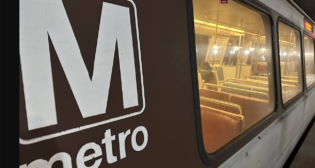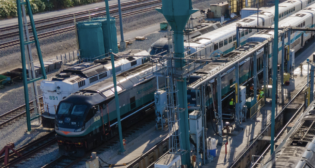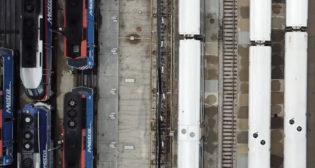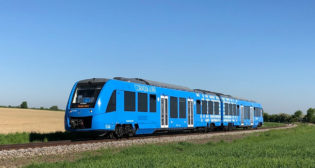
Trudeau backs Montreal REM LRT
Written by William C. Vantuono, Editor-in-ChiefCanadian Prime Minister Justin Trudeau says the government’s C$1.28 billion investment in Montreal’s planned REM (Réseau Electrique Métropolitain) light rail system will ease the burden on commuters and contribute to the fight against climate change, according to a report from CBC News.
The LRT project, financed primarily by the CDPQ (Caisse de dépôt et placement du Québec, which manages the province’s public and parapublic pension and insurance plans and has offices in eight countries), also has funding from the Quebec government. It will connect downtown Montreal to the city’s suburbs and international airport.
Trudeau confirmed his government will fund the “ambitious” plan, known by its French acronym REM, on June 15 at Montreal’s Central Station, writes CBC News reporter Benjamin Shingler. Following is Shingler’s complete report.
“In addition to making it quicker and easier for millions of Quebec residents to get around, the REM will reduce the number of cars on the roads, help ease traffic and make the air cleaner,” Trudeau said. “With this historic investment, we’re taking a huge step in the right direction.”
 Quebec Premier Philippe Couillard, Montreal Mayor Denis Coderre and CDPQ President and CEO Michael Sabia were also on the hand for the announcement. The funding comes after months of negotiations—and questions about whether Ottawa would back the plan. The Trudeau government made no mention of funding the project in its spring budget, prompting concern from Couillard.
Quebec Premier Philippe Couillard, Montreal Mayor Denis Coderre and CDPQ President and CEO Michael Sabia were also on the hand for the announcement. The funding comes after months of negotiations—and questions about whether Ottawa would back the plan. The Trudeau government made no mention of funding the project in its spring budget, prompting concern from Couillard.
On [June 15], Trudeau said the investment is consistent with his government’s broader commitment to improving public transit across the country. The price tag for the 67-km (41.5-mile) rail line, which would link downtown with the South Shore and the West Island, has risen to C$6 billion in order to add more stations in the city’s downtown area. Quebec has already committed around C$1.3 billion to the project. The CDPQ (which manages more than C$270 billion) has pledged close to C$3 billion.
The LRT project now includes 27 stations. The first trains are expected to run in 2020, though there have been questions about the timeline. Couillard said [June 15] that work will begin this fall and the first trains will be running by the end of 2020. He expects Bill 137, legislation aimed at cementing the agreement between the government and the CDPQ, to pass in the fall.
For his part, Sabia said he sees “absolutely no reason” why the project can’t be on time and on budget, adding that it’s not “a law of physics” that a construction project in Quebec should be subject to delays. “Delivering it on time and delivering it on budget can and should be a source of pride for people here in Quebec,” he said.
The [funding] will come in the form of a grant-type investment via Ottawa’s infrastructure-funding agreement with Quebec. It could eventually be funded through the Trudeau government’s proposed [Canadian] infrastructure bank, the Prime Minister said.
When asked whether the long-discussed extension of the Montreal Metro’s Blue line would eventually get federal support, Trudeau didn’t rule out the possibility in the future, but he said it should be up to local governments at the municipal and provincial level to determine what gets funding.



